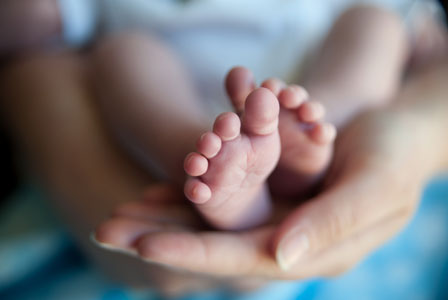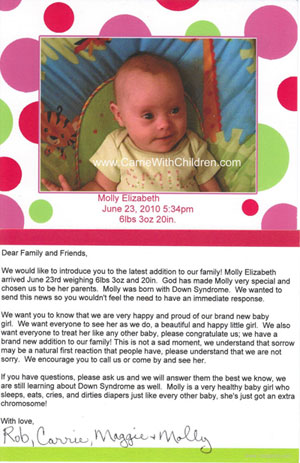
Families share how they approached the idea of including a personal note in their extra-special birth announcements after welcoming a child with special needs.
Beyond baby's
birth weight
Birth announcements. Those bundles of printed joy that trumpet, “Hey, world! Look what we created! Is this not the cutest, ever?!” A parent’s sense of pride and jubilation leap from the heavy card-stock alerts as recipients pull them eagerly from envelopes.
But, what if your child is born with an unexpected disability? If your beautiful child enters the world struggling to combat a health condition?
Providing an update
For some parents, birth announcements provide a way to update family, friends and anyone who would want to know about your greatest achievement and unexpected hurdles facing your newborn.
Linda says, “We sent out birth announcements when our daughter was about 5 months old. After she got out of the NICU and was allowed to leave the house for photos. We explained that she had Down syndrome and told a little about that. We also talked about our hopes and dreams for her. I still cry when I read that letter.”
After prenatal diagnosis
Then there’s another group, the one from which I hail. The one that has every opportunity thanks to a prenatal diagnosis to come to terms with Baby’s challenges and plan the perfect announcement months in advance, including a thoughtfully written, personal note.
Except, I didn’t. I had good intentions that folded into the shadows of the neonatal intensive care unit corridors when my son, Charlie arrived seven weeks early. During his month in the NICU, I cradled his head for hours on end and never gave one thought to birth announcements.
By the time Charlie was strong enough to come home with us, heart monitor and all, I was in the full throes of post-partum depression and barely able to engage in conversation without crying. Birth announcements that included a heartfelt testament to our love of Charlie regardless of any challenges meant nothing to me.
Looking back, I realize my regular emails to a lengthy list of family, friends and even some acquaintances was my way of casting a wide net into a dark and uncertain sea. I desperately hoped someone would grab the line and haul me to safety.
A source of healing
For other parents, sharing the news via the birth announcement provides a catharsis of sorts. Larina, whose daughter Camille has Down syndrome, describes their process: “The day after Camille was born, Brian and I wrote an email together , announcing her arrival and her diagnosis . It was very difficult to compose but we were trying to be brave.”
“I was in shock,” Larina confided, “So I didn't have many true feelings about anything at all, awful as that sounds.”
She continues, “Here's the neat part: A few weeks after we got home, I printed every response that we got to that email, and put them all in a binder, with the email message itself at the front of the binder. I have looked at it once in four years because it conjures up some tough emotions and memories... but I am so glad that we have it.”
Tackling topics head-on

Tim, who welcomed his first grandchild not long ago, grew up with a sibling who had Down syndrome. He says, “Because there are so many misunderstandings about kids with Down syndrome or other conditions, I think it is important to prepare people who don't understand and may innocently say something inappropriate or shy away because of their lack of knowledge. I like the idea of a frank birth announcement.”
Carrie shares on her blog, "Carrie with Children," that she included a short note with her daughter, Molly's birth announcement. The tone is best summarized by one line in particular: “Molly is a very healthy baby girl who eats, sleeps, cries, and dirties diapers just like every other baby, she’s just got an extra chromosome!”
Gabrielle shares her experience with flip-flopped emotions, from her single, non-parent perspective and later, as a married mom of twins who almost didn’t survive the pregnancy: “We got a birth announcement of a friend's baby who was a micro preemie. The announcement was for me, at the time, disturbing. A tiny little baby, very red, very small and so full of tubes. I could not see it as a celebration of life.
“That baby has since grown up to be a thriving teenager. Now, I cherish what is done to help babies get through that tough beginning to become that thriving teenager. I get it now, but I didn't before kids. I also think my experience while pregnant with the twins enlightened me to that.”
Not everyone sees the need for a birth announcement addendum. “I think I'd be surprised [to receive a birth announcement that includes an explanation of a disability],” says Michaela. “Not sure it's necessary because it doesn't define the child.”
“We never mentioned Sean having [Down syndrome] or a heart condition,” Jenn says. “Those that were close to us knew… We only wanted to celebrate what an adorable, precious baby he is.”
Paperless priorities
“We never sent birth announcements, but that was due to the fact that we were more focused on [our daughter] staying alive,” Dawn explains. “We didn't even get ‘newborn’ shots until she was almost 3 months old and home.”
Larissa gave birth to twins and learned her newborn son has Down syndrome. “We did not do newborn announcements or a newborn photo shoot,” she says. “It makes me sad now and I regret that we didn't do it, but at the time we were just so overwhelmed. Everything took a back seat to Cooper's health.”
As with most parenting decisions, the “right” decision typically depends on what feels right to you and your significant other.
![]() Tell us
Tell us
Have you sent or received a personalized birth announcement including information about a health issue the newborn faced? What response did you get? How do you think you'd respond if you received a special birth announcement?
Read more about special needs
The truth about my child with Down syndrome
Having a sibling with Down syndrome
How to talk to your child's peers about Down syndrome